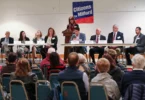By Marylu Bautista
BU News Service
BOSTON – What’s in a tweet? Boston University professors are discovering more than just words, using Twitter to study obesity.
Assistant Professor of global health, Elaine Nsoesie, Ph.D., was among a group of presenters at Boston University’s 4th annual Data Science Day on Feb. 6. Nsoesie presented her obesity-focused Twitter data research project in hopes that it shows a new creative way to capture data.
“From Twitter, you can get explicit data about this user, but you can also get explicit data about the tweet, and from the tweet information and user information, you can extract different types of information that can be useful,” Nsoesie said.
According to Nsoesie, Twitter helped her collect people’s food habits, calorie intakes, and fitness routines. She and her team manually collected and filtered their Twitter data, separating food and fitness tweets into two separate categories, later focusing on the specific types of food and exercise people were tweeting about.
Nsoesie is interested in obesity because it’s a big problem affecting a lot of people. She said that her “data is incomplete, but overall, we seem to be capturing special trends correlated with obesity.”
Nsoesie responded to a question raised by the moderator Vijaya Kolachalama, Boston University assistant professor of medicine, about the time and effort it takes to build data sets.
“There are two different challenges,” Nsoesie said. “One is getting access to data. Second, processing the data to make sense of it and that can take a lot of time.”
Nsoesie and her five-member team go through all their tweets manually, while still working on other projects.
Attendee Tanya Zlateva, dean of the Metropolitan College at Boston University, said she enjoyed the event because of its diverse panel.
“I think they are very very strong and the variety and range, it’s inspirational,” Zlateva said in regards to the panel.
Nsoesie hopes the takeaway message from her presentation is that “there are lots of data sources out there and there are innovative and creative ways in which we can solve popular problems.”








